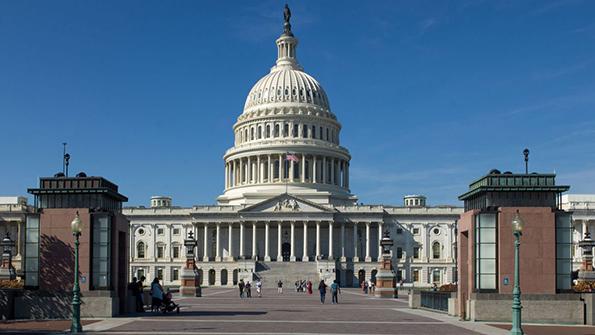ANALYSIS: Divided US Government Means Less Stimulus, Fewer New Bills

The US is likely headed for at least two years of divided government, which has good and bad consequences for the commercial airline industry.
In the days and weeks leading up to the Nov. 3 election, polls consistently showed the potential for a “blue wave” Democratic sweep of both chambers of Congress—the House and Senate—and the presidency. But that tidal wave of support never materialized. While Democratic nominee Joe Biden will be the next president, the results from down-ballot races so far indicate Republicans will pick up additional seats in the House, although the House will maintain its Democrat majority, while Republicans will likely retain a slim majority in the Senate. That suggests Senate Majority Leader Mitch McConnell (R-Kentucky) will retain effective veto power over any future fiscal stimulus bill, dashing Democratic hopes for a post-election multitrillion-dollar aid package.
Financial analysts covering the airline sector believe that a divided government—and the ensuing gridlock it produces—will lead to less overall stimulus than would have been the case under a Democratic sweep scenario. This is viewed as a negative for the airline industry because less stimulus translates to lower consumer spending and GDP growth, which puts a drag on travel demand. It also means that airlines may get less targeted relief than would have otherwise been the case, although analysts agree substantial bipartisan support for a second round of federal payroll support exists in Washington, DC.
“We viewed a Biden win with a divided Congress to be the least beneficial [outcome] for the US airline industry, primarily based on the assumption that a meaningful fiscal stimulus would be less likely,” wrote Raymond James analyst Savi Syth Nov. 8.
Cowen analyst Helane Becker agreed: “With gridlock now expected and Mitch McConnell expected to retain his position as Senate Majority Leader, we expect the next phase 4 stimulus package to be smaller than previously discussed,” she wrote Nov. 6.
While less stimulus is a negative for airlines, the reality of a Republican-held Senate means carriers will benefit from potentially lower tax rates and fewer costly regulations than if Democrats had tipped the upper chamber.
In a research note published in August, Wolfe Research analyst Hunter Keah compiled a list of nearly two-dozen proposed bills and amendments from recent years that did not become law, but potentially could under a Democratic-sweep scenario. Among the costliest items he identified were efforts to restrict ancillary fees; establish minimum seat dimensions; standardize pilot training and simulator time; and require airlines to accommodate displaced passengers through the use of interline agreements. Making matters worse for carriers, Keah predicted Democratic lawmakers in the next Congress may be more open to imposing new regulations than in years past, considering the $50 billion-plus in aid that US airlines received this year.
“Airlines were consistently beating back regulatory challenges even before COVID-19,” wrote Keah. “As airlines (successfully) seek government assistance to bridge to better times, the appetite for government retribution (for lack of a better term) may grow.”
Expectations of continued gridlock also mean the air transport sector will likely have to wait at least another two years for a comprehensive infrastructure package, which airports argue is needed to address the country’s ageing runways and terminal buildings.
“Congress still needs to pass a comprehensive COVID relief package that includes much-needed funds for airports struggling to finance operations, make debt payments and respond to the pandemic by retrofitting their facilities and adopting enhanced sanitation and health protocols,” Airport Council International-North America CEO Kevin Burke said following the election.
But while the next Congress may prove unable to pass much sweeping, new legislation, the Transportation Department under Biden could take on a more active role in regulating industry. The next president will install his own pick to replace current DOT secretary Elaine Chao, who has favored a hands-off approach toward business during her nearly four-year tenure. Under the leadership of Chao, the DOT has sought to roll back two existing rules for every new one, and the agency has taken steps to limit the circumstances in which consumers can hold airlines accountable for “unfair and deceptive” business practices.
While Biden’s full aviation agenda is not yet known, one early expected rulemaking would be a mandate that all travelers in airports and onboard commercial airliners wear masks at all times, in line with statements made on the campaign trail calling for a national mask mandate in interstate transportation. Other key focal points will include establishing procedures to safely restart international travel through the use of passenger COVID-19 testing and travel corridors, as well as a plan to distribute a vaccine when one becomes widely available.
All told, in evaluating the impact of a Biden victory and a divided Congress, carriers will have to weigh the benefits of less sweeping legislation against the disadvantage of lower levels of fiscal stimulus. While much remains uncertain about the course of the pandemic and the timeline for a meaningful recovery in air travel demand, US carriers can at least be certain there won’t be too much action coming out of Washington over the next two years—for better or worse.
